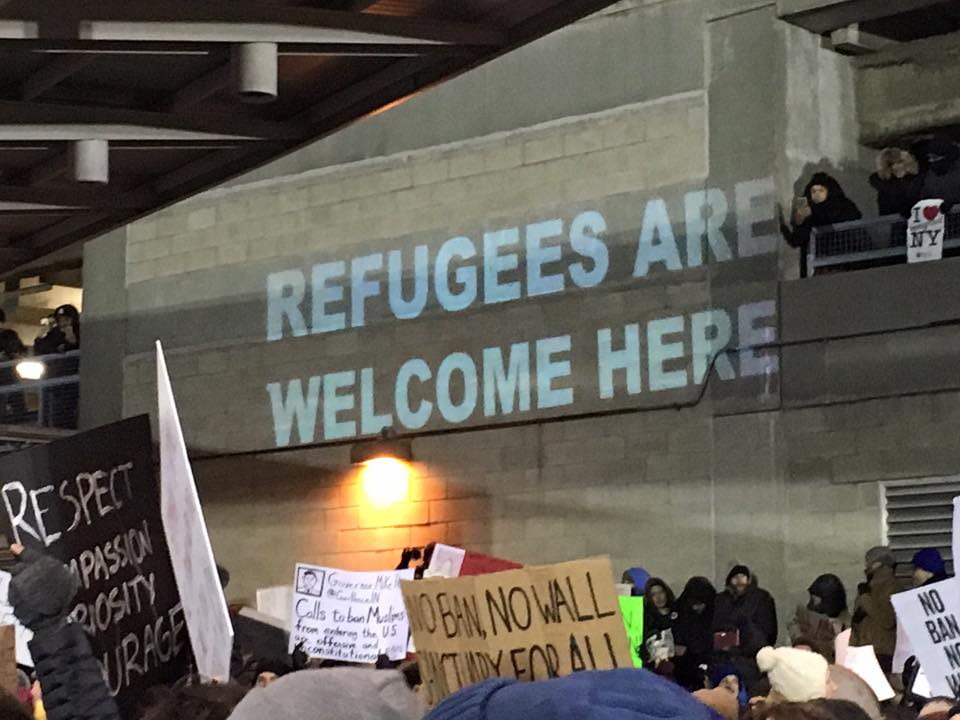
In light of recent actions from the White House banning immigration of Muslims of certain countries, including permanent residents and visa holders of the U.S., it is imperative that we speak about the right to non-discrimination.
Discrimination is one of the most common and most widespread human rights violations. It is multifaceted and present at all levels of public governance and in civil society. It affects all parts of people’s lives, including politics, education, employment, social and medical services, housing, the penitentiary system, law enforcement, and the administration of justice in general. It can be open and clearly visible (e.g., ingrained in a state’s institution or laws), or it can be implicit and form part of structural violence (e.g., discrimination against people living in poverty). While no general definition of discrimination exists in international law, we usually consider discrimination to mean any distinction, exclusion, restriction or preference which is based on specific characteristics of an individual and which has the purpose or effect of nullifying or impairing the recognition, enjoyment or exercise by all persons, on an equal footing, of all rights or freedoms.
Non-discrimination is thus one of the most fundamental principles of human rights. The very essence of human rights – rights that are inherent to all human beings, inalienable equally applicable to everyone, at all times, everywhere, and in all situations – is embodied in non-discrimination, which gives voice to the equality of all human beings. The Universal Declaration of Human Rights covers non-discrimination in Article 2:
“Everyone is entitled to all the rights and freedoms set forth in this Declaration, without distinction of any kind, such as race, colour, sex, language, religion, political or other opinion, national or social origin, property, birth or other status.”
Essentially, non-discrimination is the right to be treated equally before the law and in all aspects of life. It guarantees that equal circumstances are dealt with equally in law and practice. However, not all cases of unequal treatment are automatically discrimination. For example, affirmative action on behalf of marginalized groups to establish equality in fact is permissible. A violation of non-discrimination clauses would arise if similar cases are treated differently, if there is no reasonable or objective justification for different treatment, or if the means used are not proportional to the aim sought.
Today, this fundamental principle is embedded in all major international human rights treaties, some of which specifically focus on non-discrimination (e.g., the Convention on the Elimination of All Forms of Racial Discrimination or the Convention on the Elimination of Discrimination Against Women). There have been efforts to expand non-discrimination beyond the traditionally covered characteristics to include, for example, persons with disabilities or the LBTQ+ community. However, non-discrimination was not always a principle of international law. It was only after WWII, which exhibited the consequences of deliberate, systematic discrimination, persecution, and mass murder of specific groups in the most horrific way, that the principle of non-discrimination fully entered the realm of international politics and law.

In the U.S., non-discrimination is included in the 5th Amendment (Due Process Clause) and 14th Amendment, which provides in its Equal Protection clause that states may not “deny to any person within its jurisdiction the equal protection of the laws.” Nevertheless, we all know that discrimination, racism, and xenophobia have a long history in the U.S. The legacy of slavery and Jim Crow laws continue today in institutionalized racism and segregation along socio-economic lines. Similarly, xenophobia and the barring of immigrants based on their country of origin has been common practice. In 1924, Congress enacted laws that banned Asians from immigrating into the United States and established “national origins quota” that favored Western Europeans and discriminated against Eastern Europeans, Asians, and Africans. This practice was abandoned officially only in 1965 with the enactment of the Immigration and Nationality Act, which states that no one can be “discriminated against in the issuance of an immigrant visa because of the person’s race, sex, nationality, place of birth or place of residence.” Note that religion is not mentioned in this list and that this law only applies to immigrants, namely people who intend to stay in the U.S. permanently, not temporary visitors such as refugees, students, tourists, or guest workers. This law was designed not only to protect immigrants, but also American citizens who have the right to sponsor their family members or marry a foreigner without discrimination.
President Trump’s executive order, which suspends the entry of all refugees for 120 days, barres Syrian refugees indefinitely, and temporarily freezes immigration from seven mostly Muslim countries, thus most likely not only violates U.S. laws, but also fundamental principles of human rights, esp. the right to non-discrimination. It also stands in opposition of core values of U.S. culture, which includes a history of welcoming immigrants and a philosophy of humanitarianism. While the ruling by a federal judge last night partially blocks the President’s actions, it only prevents the government from deporting those who have already arrived at U.S. airports. It does not allow them to enter the country or discuss the constitutionality of the President’s order.
Victims of war and violence have been victimized yet again. The heart-wrenching stories and pictures of families torn apart, of students seeing their dreams shattered, and of professionals’ fearing for their livelihoods will probably become a common sight if the implementation of President Tump’s executive order continues. The chaos and outrage worldwide are likely to persist, with grave and long term consequences for the U.S., for its reputation in the world, and the values that it stands for.
It is important in these times that we are well informed about our human rights and those of others. We will update this post as more information becomes available.


